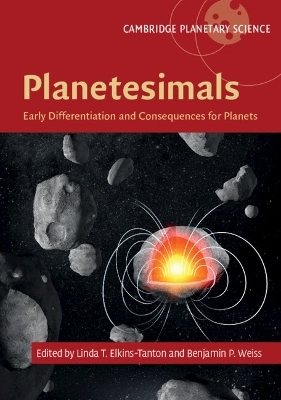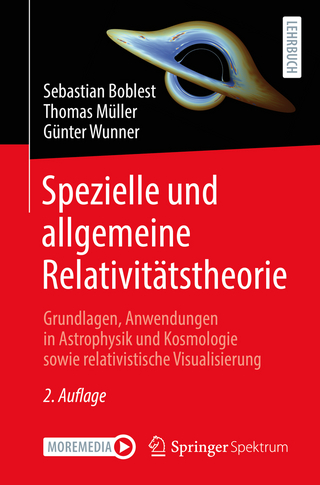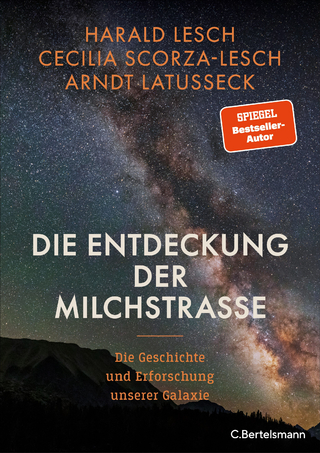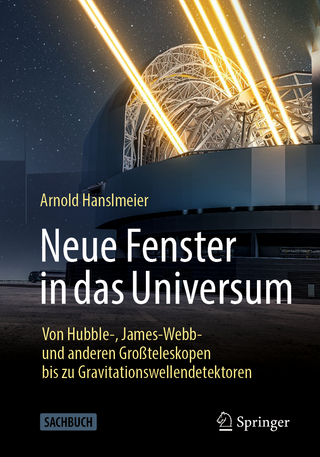
Planetesimals
Cambridge University Press (Verlag)
978-1-107-11848-5 (ISBN)
Processes governing the evolution of planetesimals are critical to understanding how rocky planets are formed, how water is delivered to them, the origin of planetary atmospheres, how cores and magnetic dynamos develop, and ultimately, which planets have the potential to be habitable. Theoretical advances and new data from asteroid and meteorite observations, coupled with spacecraft missions such as Rosetta and Dawn, have led to major advances in this field over the last decade. This transdisciplinary volume presents an authoritative overview of the latest in our understanding of the processes of planet formation. Combining meteorite, asteroid and icy body observations with theory and modelling of accretion and orbital dynamics, this text also provides insights into the exoplanetary system and the search for habitable worlds. This is an essential reference for those interested in planetary formation, solar system dynamics, exoplanets and planetary habitability.
Linda T. Elkins-Tanton is the Director of the School of Earth and Space Exploration at Arizona State University. Her research focusses on the evolution of terrestrial planets and the relationships between Earth and life on Earth. Elkins-Tanton is a two-time National Academy of Sciences Kavli Frontiers of Science Fellow. She won a National Science Foundation CAREER award in 2008, the Explorers Club Lowell Thomas prize in 2010, and in 2013 was named the Astor Fellow at the University of Oxford. She co-edited Volcanism and Global Environmental Change (Cambridge, 2015), and has written a six-book reference series entitled The Solar System. In 2012 she was honored with an asteroid named 8252 Elkins-Tanton. Benjamin P. Weiss is a Professor of Planetary Sciences at Massachusetts Institute of Technology and Chair of the Program in Planetary Sciences within the Department of Earth, Atmospheric and Planetary Sciences. Weiss' research interests include the formation, evolution and history of terrestrial planets and small bodies. Weiss was awarded the Macelwane Medal in 2009 and was the 2003 winner of the Francis and Milton Clauser Doctoral Prize at the California Institute of Techmology. He is a Fellow of the American Geophysical Union, and in 2012 he was honored with an asteroid named 8069 Benweiss.
List of contributors; 1. Planetesimals Benjamin P. Weiss; Part I. Dynamical Evolution: 2. Signatures of hit and run collisions Erik Asphaug; 3. Using the main asteroid belt to constrain planetesimal and planet formation William Bottke and A. Morbidelli; Part II. Chemical and Mineralogical Diversity: 4. Differentiation under highly reducing conditions: new insights from meteorites and mercury Timothy J. McCoy and Emma S. Bullock; 5. Origin and evolution of volatile-rich asteroids Julie Castillo-Rogez and Edward Young; 6. Silicate melting and volatile loss during differentiation in planetesimals Roger R. Fu, Edward Young, Richard C. Greenwood and Linda T. Elkins-Tanton; 7. Iron and stony-iron meteorites: evidence for the formation, crystallization, and early impact histories of differentiated planetesimals Alex M. Ruzicka, Henning Haack, Nancy L. Chabot and Edward R. D. Scott; 8. Arguments for the non-existence of magma oceans in asteroids Lionel Wilson and Klaus Keil; 9. Magnetic fields on asteroids and planetesimals Aaron Scheinberg, Roger R. Fu, Linda T. Elkins-Tanton, Benjamin P. Weiss and Sabine Stanley; 10. Magnetic mineralogy of meteoritic metal: paleomagnetic evidence for dynamo activity on differentiated planetesimals Richard J. Harrison, James F. J. Bryson, Claire I. O. Nichols and Benjamin P. Weiss; 11. Chronology of planetesimal differentiation Thorsten Kleine and Meenakshi Wadhwa; 12. Stable isotope evidence for the differentiation and evolution of planetesimals Anat Shahar, Paul Savage and Fred Moynier; Part III. Asteroids as Records of Formation and Differentiation: 13. Composition of Solar System small bodies Pierre Vernazza and Pierre Beck; 14. Evidence for differentiation among asteroid families Thomas H. Burbine, Francesca E. DeMeo, Andrew S. Rivkin and Vishnu Reddy; 15. Dawn at Vesta: paradigms and paradoxes Carol A. Raymond, Christopher T. Russell and Harry Y. McSween, Jr; 16. Planetesimals in debris disks Andrew N. Youdin and George H. Rieke; Part IV. Early Differentiation and Consequences for Planet Formation: 17. Consequences for planet formation Linda T. Elkins-Tanton; Index.
| Erscheinungsdatum | 27.01.2017 |
|---|---|
| Reihe/Serie | Cambridge Planetary Science |
| Zusatzinfo | 40 Plates, color; 55 Halftones, black and white; 33 Line drawings, black and white |
| Verlagsort | Cambridge |
| Sprache | englisch |
| Maße | 180 x 252 mm |
| Gewicht | 1000 g |
| Themenwelt | Naturwissenschaften ► Physik / Astronomie ► Astronomie / Astrophysik |
| ISBN-10 | 1-107-11848-4 / 1107118484 |
| ISBN-13 | 978-1-107-11848-5 / 9781107118485 |
| Zustand | Neuware |
| Haben Sie eine Frage zum Produkt? |
aus dem Bereich


